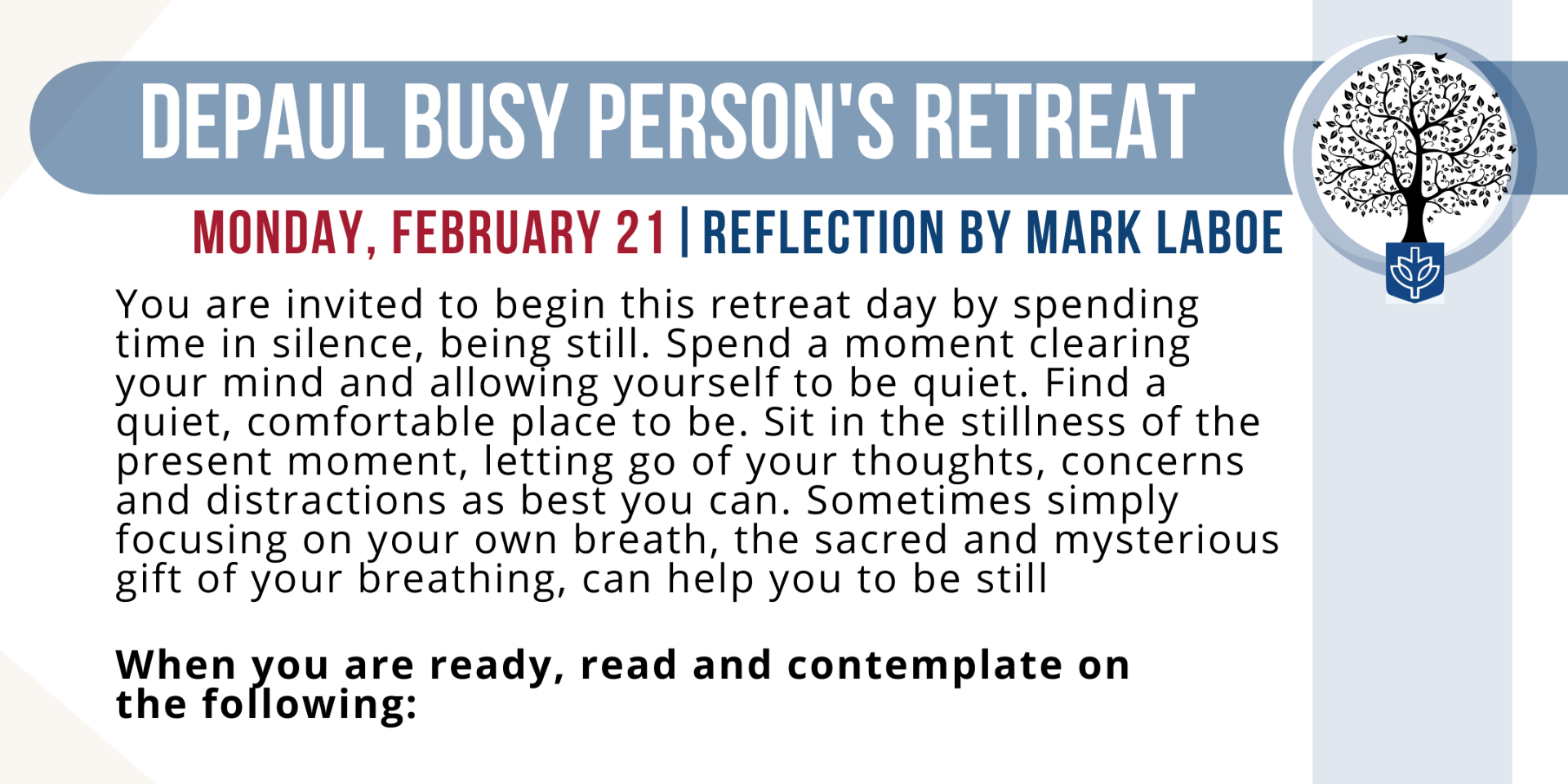

To view or download a PDF copy, click here.
So, you signed up for a Busy Person’s Retreat this week. Something drew you to do so. What was it?
What did you assess was needed or desired in your life to sign up to receive these daily reflections for a week?
Congratulations on taking this step… whether toward self-care, toward reflection and mindfulness, toward deeper meaning and purpose, or toward whatever good and authentic yearning inspired you to do so.
As we begin this week of reflection, let me ask you one more question: When you consider yourself a “busy person”…why is that so, and what does that describe or mean to you?
When I catch myself thinking or talking about how horribly busy I am, I find it helpful and informative to catch myself, to pause and to do a moment of self-assessment. Why am I feeling so busy? And, what does “busy” describe or mean to me in this moment? How much of this “busy-ness” is, at some level, by habit or choice and how much of it is necessity or imposed upon me?
By taking just a moment to pause and reflect in this way over the years, I have come to see that in our U.S. American culture at large, we tend to put a high value on being busy – or, at least, being seen as one who is busy. Being busy, or feeling rushed while moving from one thing to the next, or having so much to do that we can’t possibly slow down, are at times projected or proclaimed as evidence of our productivity in front of others, or as unspoken justifications of our own importance.
While this tendency certainly has been and remains part of my own erroneous way of thinking, a habit present to me from my early years, I can say fairly confidently that it is also clearly a tendency that we absorb from the broader cultural milieu in which we live. In other words, when I stop to pause and reflect for just a moment about why I am feeling so busy and what the word is describing or means to me in any given moment, I realize that I am at times simply wrapped up in a cultural norm that is assessing my worth in a way that is, quite frankly, just not healthy, meaningful, fair, nor accurate. Assessing our worth based on how busy we are is absurd – yet it is so commonplace.
In speaking of the Jewish/Christian practice of Sabbath as a day of rest each week, author Walter Brueggemann points out the way in which such rest can actually be seen and practiced as a fruitful form of resistance to the dominant culture: “Sabbath is a practical divestment so that neighborly engagement, rather than production and consumption, defines our lives.” [i](18)
At times, being or feeling busy may indeed allow us to see that we have put unrealistic expectations on ourselves, or that impossible expectations have indeed been put on us by others – whether in a job or in our home life – and we are entangled in them. This insight has the potential to be liberating, if we are able to accept and name it for what it is, to ask for the help of others to alleviate some of the pressure, or to make other changes within our control to bring us back into a more healthy and realistic balance.
Very often, we may find that the fullness of our life and who we are may in fact be harmed or lessened to some degree by our being overly or constantly “busy.” Our “busy-ness” does not allow the time and space for new growth, for the flowering of seeds planted, for the fire within us to breath in the fresh air needed to fuel our authentic creativity and passion. It also doesn’t allow us room to reflect, an essential behavior or practice necessary to look objectively at our life experiences and to learn from them. Being overly busy doesn’t allow time and space for rest and relaxation, for friendships to be nurtured, or for us to be fully and truly present to the people in our lives and to the realities before us. When we are busy, we are rarely “mindful” and certainly not “soul-full.”
What is hurt by your taking a few minutes now and regularly in your life to pause, to breathe deeply, and to slow down just a bit? Answer: Probably nothing and no one at all.
What is gained by doing so? Answer: The fullness of who you are. And, that is a very good thing for you, for others around you and for the world. Your wholeness is not only healthy for you, but is also a gift to others. Taking a few minutes each day – maybe several times a day – simply to pause, breathe and reflect will help you to be happier, more at peace, more creative and effective… and in the end, if you and others around you need to know… it will probably help you to be more productive as well!
One little life hack that I have found helpful is to catch myself when I use the word “busy” and – if it makes sense to do so – to describe my life situation instead as “full.” My life is very full has a different ring to it, a different meaning. I like the idea of my cup overflowing with the life that I am receiving – not something I am doing or accomplishing, but something that I am choosing to fully embrace and engage in the best way I can.
May this week’s reflections allow you the space and nourishment you need to grow into a new and more fruitful fullness!
[i] Walter Brueggemann. Sabbath as Resistance: Saying No to the Culture of Now (2014). Louisville: Westminster John Knox Press. P. 18